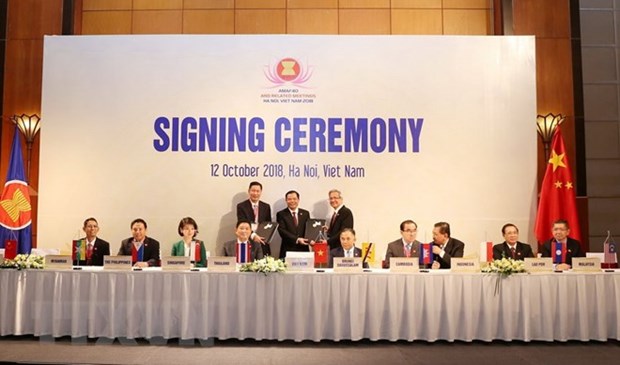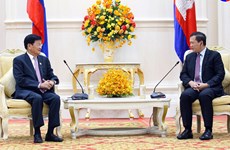ASEAN+3 steps up cooperation in food security
The 18th Meeting of the ASEAN Ministers on Agriculture and Forestry and the Ministers on Agriculture of China, Japan and the Republic of Korea (18th AMAF+3) took place in Hanoi on October 12.
 Signing ceremony of MoU on agricultural and food cooperation between ASEAN countries and China (Source: VNA)
Signing ceremony of MoU on agricultural and food cooperation between ASEAN countries and China (Source: VNA)Hanoi (VNA) – The 18th Meeting of the ASEAN Ministers on Agriculture and Forestry and the Ministers on Agriculture of China, Japan and the Republic of Korea (18th AMAF+3) took place in Hanoi on October 12.
In his opening remarks, Vietnamese Minister of Agriculture and Rural Development Nguyen Xuan Cuong, as Chair of the meeting, said the event takes place amid challenges to food security, fierce competition in agricultural production and trade, and more severe impacts of climate change.
Over the past years, the regional countries have seen great progress in agriculture and forestry derived from changes in household income, consumer taste and food distribution system as a result of urbanisation and industrialisation, he said.
This poses both opportunities and challenges to ASEAN and its three partner countries in ensuring food security and safety, narrowing development gap, building rural areas in combination with sustainable and inclusive agricultural development, he noted.
Cuong spoke highly of the agricultural cooperation of ASEAN and the three partner countries over the past time and thanked the assistance of the three countries through activities within the framework of the ASEAN Plus Three Cooperation Strategy on Food, Agriculture and Forestry (APTCS) for 2016-2025.
To promote the implementation of this strategy, he suggested the ASEAN+3 Ministers on Agriculture and Forestry focus more on stepping up collaboration in food and nutrition security as well as mutual support in building and developing sustainable and environmentally friendly agriculture.
At the same time, they should study and transfer advanced technologies in agro-forestry-fishery production and processing in order to increase productivity and product quality, he added.
It is also necessary to mobilise resources to invest in agriculture, especially those of enterprises via public-private partnership in the field; and boost cooperation in scientific and technological research and application in agro-forestry-fishery production through the transfer of production, management, operation and supervision technologies in line with farm produce supply chains.
The countries need to develop hi-tech and organic agriculture, and promote the application of information technology in agricultural management.
According to the Vietnamese official, the sides should work together to boost trade of food and farm produce between ASEAN and its three partner countries through the harmonisation of standards and processes regarding food safety and plant and animal quarantine toward building safe production areas, and regional cooperation in preventing cross-border animal disease transmission.
They need to share agriculture, farmer and rural development models of ASEAN+3 countries, thus improving farmers’ adaptation and competitiveness, he said.
At the meeting, the ministers appreciated the implementation of the APTCS for 2016-2025 and some important activities to enhance food security, manage forests sustainably, mitigate and adapt to climate change, strengthen plant and animal health and disease control, develop human resources, and improve productivity, quality and capacity to promote agricultural products.
They also spoke highly of progress in realising the ASEAN Plus Three Emergency Rice Reserve (APTERR) and reaffirmed their commitment to continued support for the implementation of APTERR. They also recognised the implementation of the agreement’s Tier+3, especially a programme in particular for APTERR stockpiled rice from Japan and the Republic of Korea that is stored in Cambodia, Lao PDR, the Philippines and Myanmar.
The ministers applauded activities within the framework of the Tier+1 conducted between Japan and the Philippines, which is considered the first trial run for APTERR. The meeting encouraged APTERR members to continue engaging in the Tier+3 programmes.
They also acknowledged the progress of the ASEAN+3 food security information system, particularly developing food security information in the region and improving the data on ASEAN food and farm produce processing and distribution.
On the basis of results achieved in the cooperation process, a number of agreements were signed at the meeting, including a memorandum of understanding (MoU) between the Governments of ASEAN countries and China on agricultural and food cooperation, and another between ASEAN and the UN Food and Agriculture Organisation (FAO) on strengthening cooperation in agriculture and forestry, along with a protocol amending the ASEAN Plus Three Emergency Rice Reserve (APTERR).
The 19th AMAF+3 is scheduled to take place in Brunei next year.-VNA











